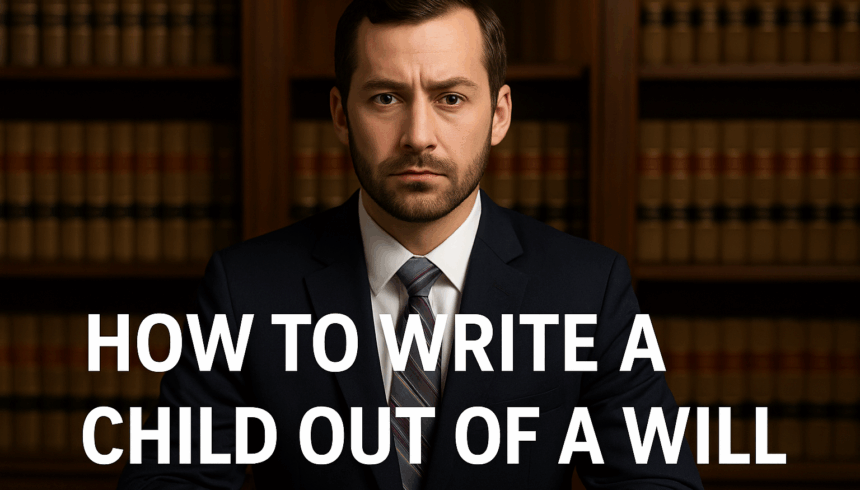
 By Evan Lange
By Evan Lange
Before proceeding, please review the legal disclaimer.
Let’s be honest—this isn’t an easy topic. Writing a child out of your will is one of the most emotional (and legally sensitive) estate planning decisions a parent can make.
Whether it’s due to estrangement, financial reasons, or deeply personal issues, it’s your legal right to choose how your assets are distributed. But in Texas, if you want to disinherit a child, you have to do it the right way.
Here’s what you need to know to make it stick—and avoid challenges after you’re gone.
Yes. In Texas, there is no law requiring you to leave anything to an adult child.
Unlike spouses (who have certain legal protections), adult children don’t have an automatic right to inherit. That means you can:
Leave them nothing
Leave them a smaller share
Exclude them from the will entirely
But doing this wrong—or being vague about it—can lead to will contests, family fights, or even court battles.
If you want to disinherit a child, don’t just leave their name out of the will.
You must name the child and clearly state your intent to disinherit them.
Example clause:
“I have intentionally and with full knowledge omitted my son, John Smith, from this will. He is to receive nothing from my estate.”
This makes your wishes unmistakable and prevents the child from arguing they were forgotten by mistake.
Tempted to say, “You’ll only inherit if you go to college or stop dating so-and-so”? Be careful.
While conditional gifts are allowed in Texas, they can:
Create resentment
Be hard to enforce
Open the door to legal disputes
If your goal is to make a clean break, keep it simple and direct.
A no-contest clause (also called an “in terrorem” clause) says that if anyone challenges the will, they get nothing.
This doesn’t stop a child from suing—but it raises the stakes. If they’re still getting something under the will, the risk of losing that can discourage them from fighting.
⚠️ Important: Texas courts won’t enforce no-contest clauses if the challenge was brought in good faith. So it’s not bulletproof—but it helps.
Disinheriting someone isn’t just about the will. Make sure to:
Update beneficiary designations (life insurance, retirement accounts, etc.)
Change trust provisions, if you’re using one
Review joint accounts or payable-on-death designations
If your will says one thing but your IRA still names the child as beneficiary, they’ll still get the money.
Disinheriting a child is a high-risk move. Doing it wrong could:
Trigger a will contest
Lead to claims of undue influence
Result in a partial intestate estate (if the will isn’t valid)
A Texas estate planning attorney will:
Draft the language correctly
Help you document your capacity
Guide you through options like irrevocable trusts, gifting strategies, or alternative ways to distribute assets
This changes things.
In Texas, you can’t disinherit a minor child of your legal obligation to provide for them. While you can exclude them from inheritance, they may still:
Receive child support from your estate (if there’s a court order)
Be entitled to certain protections as dependents
Talk to a lawyer if you’re considering disinheriting a child who’s still under 18.
Carol hadn’t spoken to her son in 15 years. She left everything to her daughter but forgot to mention her son by name in the will.
After Carol died, her son argued that she simply forgot to include him. The court found the will ambiguous, and he ended up receiving a portion of the estate.
If she’d clearly stated her intent to disinherit him, the outcome might have been different.
You can disinherit a child in Texas—but you have to do it carefully and clearly.
The best way to make sure your wishes are respected is to:
Be direct and specific in your will
Use a no-contest clause
Update all related documents
Work with an estate planning lawyer
Contact The Lange Firm to draft a will that reflects your wishes, avoids conflict, and protects your family’s future.
Follow our newsletter to stay updated.

2025- The Lange Firm all rights reserved.

Mr. Evan B. Lange is the attorney responsible for this website. | All meetings are by appointment only. | Principal place of business: Sugar Land, Texas.
The information you obtain at this site is not, nor is it intended to be, legal advice. You should consult an attorney for advice regarding your individual situation. We invite you to contact us and welcome you to submit your claim for review. Contacting us does not create an attorney-client relationship. Please do not send any confidential information to us until such time as an attorney-client relationship has been established.